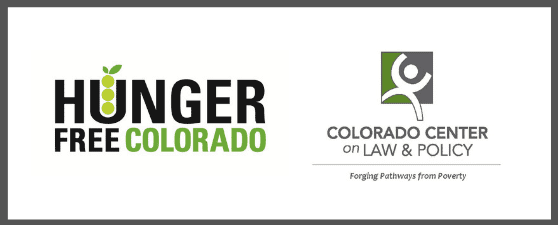A summary of the list of recommendations on the implementation of the OBBBA in Colorado regarding public benefits systems and work requirements.
Recent articles
CCLP testifies in support of Colorado’s AI Sunshine Act
Charles Brennan provided testimony in support of Senate Bill 25B-004, Increase Transparency for Algorithmic Systems, during the 2025 Special Session. CCLP is in support of SB25B-004.
Coloradans launch 2026 ballot push for graduated state income tax
New ballot measure proposals would cut taxes for 98 percent of Coloradans, raise revenue to address budget crisis.
CCLP statement on the executive order and Colorado’s endless budget catastrophe
Coloradans deserve better than the artificial budget crisis that led to today's crippling cuts by Governor Jared Polis.
Policy could bolster food assistance for older Coloradans and people with disabilities

A new policy will go into effect March 15 that will help older adults and people with disabilities access additional benefits through the Supplemental Nutrition Assistance Program (or SNAP).
In Colorado, households that include a person with a disability or an older adult can deduct their medical expenses from their income when applying for food stamps, federally known as SNAP, raising their monthly benefit amount. One of the eligible expenses are those related to medical transportation such as mileage, public transit fare and tolls.
Previously, mileage reimbursement in Colorado was calculated at the IRS medical rate of 20 cents per mile. The new policy will change reimbursement to the IRS business rate of 58 cents per mile.
This rule change was developed by the Colorado Center on Law and Policy and Hunger Free Colorado. It was advanced by the Colorado Department of Human Services and ratified by the Colorado Board of Human Services.
If an older adult or person with a disability has medical expenses that average at least $35 per month, they qualify for the Standard Medical Expense Deduction (SMED) of $165 which can increase their benefit amount. SNAP clients can keep receipts, copay statements and other documentation of their medical expenses to qualify for this deduction. The medical mileage expense is self-reported and can be calculated based on the frequency and location of their medical and pharmaceutical visits. Individuals with medical expenses of more than $200 per month can have the total cost deducted to receive more than the standard $165 medical deduction.
For those whose only medical expense is mileage, this change is the difference between having to drive 60 miles per month to qualify for the standard deduction versus 175 miles previously.
For example, imagine a household consisting of one older adult or person with a disability. Their monthly income is $1200 from Social Security, they are responsible for utility payments, and they pay monthly rent of $700. Without claiming any medical deductions, this household would qualify for about $79 per month in SNAP benefits. However, if this household showed that they have more than $35 per month in medical expenses and received the Standard Medical Expense Deduction, their monthly benefit amount would be increased to about $153 per month. That’s $888 in additional food assistance benefits per year.
This change will improve access to healthy food for Coloradans struggling to make ends meet. We applaud the Colorado Department of Human Services and Board of Human Services for taking this important step to address hunger among people with disabilities and older Coloradans.
If you are interested in learning more about whether you are eligible for SNAP benefits, please call the Food Resource Hotline at 855-855-4626. You may also obtain an estimate of your monthly SNAP benefit amount at www.gapmap.org/calculator.
-Anya Rose, Hunger Free Colorado & Jack Regenbogen, Colorado Center on Law and Policy
